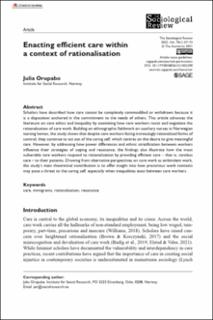| dc.description.abstract | Scholars have described how care cannot be completely commodified or withdrawn because it is a disposition anchored in the commitment to the needs of others. This article advances the literature on care ethics and inequality by examining how care workers resist and negotiate the rationalisation of care work. Building on ethnographic fieldwork on auxiliary nurses in Norwegian nursing homes, the study shows that despite care workers facing increasingly rationalised forms of control, they continue to act out of the caring self, which centres on the desire to give meaningful care. However, by addressing how power differences and ethnic stratification between workers influence their strategies of coping and resistance, the findings also illustrate how the most vulnerable care workers respond to rationalisation by providing efficient care – that is, careless care – to their patients. Drawing from alternative perspectives on care work as ambivalent work, the study’s main theoretical contribution is to offer insight into how precarious work contexts may pose a threat to the caring self, especially when inequalities exist between care workers. | |
